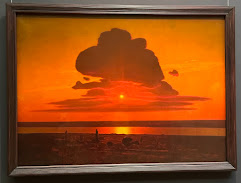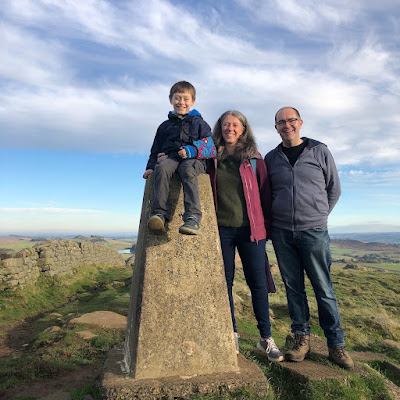This week, it's been one full year since Russia launched a full-scale attack on Ukraine, a country I love deeply. I've been in awe of the courage of the Ukrainian people--both the people I know, wherever they are, and the people I read about in the news. It's clear that in addition to fighting on the battlefield, there are also battles being fought about culture and cultural heritage. In this grab-bag post, I just wanted to highlight some work I admire (there is so much more too!).
First, the power of a single voice. Nadia Parfan was a student of mine the very first year I went to Ukraine (2009). She also was good enough to serve as my translator sometimes when I returned to Ukraine. For some reason, I have such a clear memory of her attempting to explain post-Soviet museum culture to me as we walked up a set of steps. Not an easy explanation, for sure!
Her new short film, "I Did Not Want to Make a War Film," has just been featured on the New Yorker's website so it's gotten loads of attention already in the United States: you may have already come across it. If you haven't seen it yet, please take a watch. This is such a personal story, using the tools of filmmaking, friends, and family to help all of us understand, at least a small bit, about the ways in which the war is affecting everyone in Ukraine, not just on the battlefield. From her grandmother's prayers to the joy of returning to Kyiv, the city she loves, to that tamarind plant, it's just one story of the millions about this year of war.
Dozens of Ukrainian scholars have opened new conversations about Russia as a colonial power and about the ways in which that colonial power has meant that Ukrainian artists and artworks have been ignored, misnamed, or minimized in European and American museums. Last week at the Metropolitan Museum of Art in New York, I found at least two re-written labels on artworks, due, I feel sure, to the pressure of those scholars and journalists.
I wish the Met had actually owned up to what the previous labels had said, as a way to open up a broader discussion, but at least the change was made. To learn more about Ukrainian art history and decolonization efforts, follow Oksana Semenik on Twitter at @ukr_arthistory, and for fascinating and important threads on Russia as a colonial power, follow Maxim Eristavi on Twitter @maximeristavi. Many, many more folks are doing this work as well.
Individual actions are joined by collective actions. ICOM-Ukraine, the national committee of the International Council of Museums, has actively worked to have ICOM take a strong stand. This past week ICOM-Germany did just that. ICOM-Germany is the largest national committee so this stand takes a significant message to the larger museum community. In a statement (read in full here) the committee said,
With immediate effect, ICOM Germany is boycotting the Russian National Committee as the national association under the Russian flag. In principle, the German National Committee will neither cooperate with ICOM Russia nor participate in events at which representatives of ICOM Russia or Russian museum colleagues are present. ICOM Germany is also demanding that the Russian National Committee be suspended at international level. To this end, talks with other ICOM committees and ICOM International are being intensified. The aim is to completely stop working with ICOM Russia and to exclude the Russian National Committee from the world association until further notice.
The board of ICOM Germany shows solidarity with all democratic, progressive and liberal institutions and people in Russia. It is aware that the exclusion will also affect employees in Russian museums who work for peace and justice. However, the cultural sector must not permanently claim a special role or postulate a general impression of innocence. The systematic looting of Ukrainian museums, which according to current knowledge is supported by Russian museum actors and is an example of ethical transgression, should no longer go uncommented. The reports and pictures from Ukrainian museums speak a clear language.
So what can you, with your single voice do?
- Listen, watch, read, and think critically.
- Amplify good work being done. If you're a member of ICOM, can you encourage your national committee to join Germany? Can you take a look at your own collections?
- Contribute financially if you are able. It seems as if local organizations/individuals on the ground are able to quickly deliver aid of all sorts than the big international ones (in my mind, World Central Kitchen is a notable exception and one I support for their work everywhere). In the museum world, there's the Museum Crisis Center, founded and run by Ukrainian museum workers which is supporting both institutions and individuals. The Heritage Emergency Response Initiative (HERI), also founded and run by Ukrainians, has focused on a wide range of support, much of it practical (generators and fire extinguishers, for instance). HERI is now broadening its work to consideration of what post-war recovery efforts will look like for the cultural heritage sections. All sorts of private citizens are raising funds to support both military and civilian needs. For instance, The poet/musician Sergey Zhadan raises funds for drones, trucks, and other equipment for the army--so far, more than 100 vehicles.
Like it or not, we will have to renew our sense of time, perspective, and continuity. We are fated to have a future. Moreover, we bear responsibility for it. Now, it is shaped by our visions, our convictions, our willingness to take responsibility. We will work at returning our sense of the future, since there’s just so much in our memories that demands our involvement tomorrow. We are all linked by this current that carries us, that won’t let us go, that unites us. We are all linked by our language. Even if, at a certain moment, its capabilities seem limited or insufficient. Nevertheless, we will be forced to return to it and its capabilities which give us hope that, in the future, there will not be any misunderstandings or anything left unsaid.
Dear Ukrainian colleagues and friends, the new visions, convictions, and willingness to take responsbility that Zhadan mentions, will surely bring a new peaceful future.

















